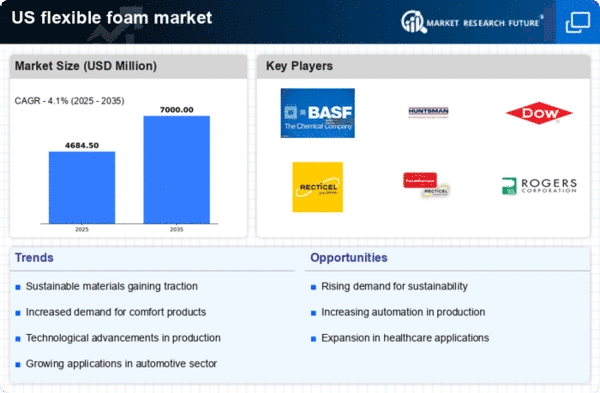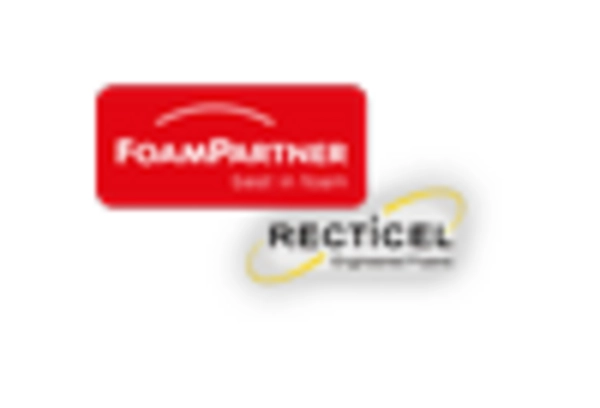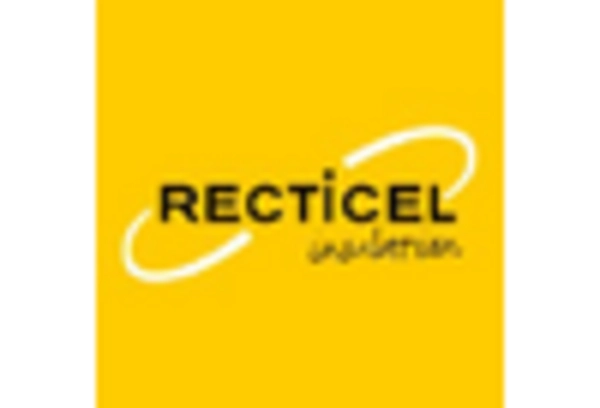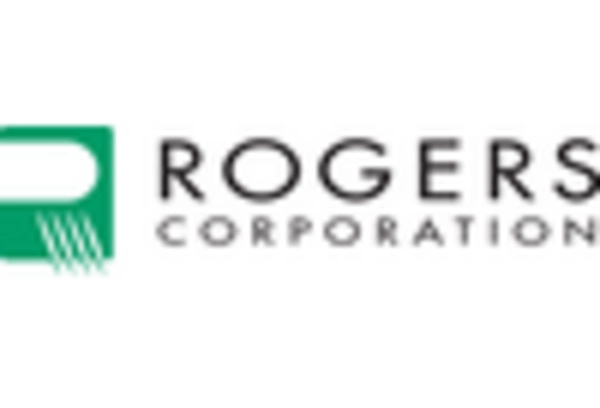The flexible foam market is characterized by a dynamic competitive landscape, driven by innovation, sustainability, and strategic partnerships. Key players such as BASF SE (DE), Huntsman Corporation (US), and Dow Inc. (US) are actively shaping the market through their distinct operational focuses. BASF SE (DE) emphasizes innovation in product development, particularly in eco-friendly foam solutions, which aligns with the growing demand for sustainable materials. Huntsman Corporation (US) has adopted a strategy of regional expansion, enhancing its manufacturing capabilities in North America to better serve local markets. Meanwhile, Dow Inc. (US) is leveraging digital transformation initiatives to optimize its supply chain and improve operational efficiency, thereby enhancing its competitive positioning. Collectively, these strategies contribute to a moderately fragmented market structure, where the influence of major players is significant yet allows for the emergence of niche competitors.In terms of business tactics, companies are increasingly localizing manufacturing to reduce lead times and enhance responsiveness to market demands. Supply chain optimization remains a critical focus, particularly in light of recent global disruptions. The competitive structure of the flexible foam market appears to be moderately fragmented, with several key players exerting considerable influence while also allowing for smaller firms to thrive through specialized offerings. This balance fosters a competitive environment where innovation and customer-centric strategies are paramount.
In October BASF SE (DE) announced the launch of a new line of bio-based flexible foams, which are designed to meet the stringent sustainability criteria set by various industries. This strategic move not only positions BASF as a leader in sustainable materials but also responds to the increasing regulatory pressures and consumer preferences for environmentally friendly products. The introduction of these foams is likely to enhance BASF's market share and strengthen its brand reputation in the eco-conscious segment.
In September Huntsman Corporation (US) completed the acquisition of a regional foam manufacturer, which is expected to bolster its production capabilities and expand its product offerings in the North American market. This acquisition reflects Huntsman's commitment to enhancing its operational footprint and responding to the growing demand for customized foam solutions. The strategic importance of this move lies in its potential to increase market penetration and improve customer service through localized production.
In August Dow Inc. (US) unveiled a new digital platform aimed at streamlining its supply chain processes and enhancing customer engagement. This initiative is indicative of Dow's focus on digital transformation, which is becoming increasingly vital in maintaining competitive advantage. By integrating advanced analytics and AI into its operations, Dow is likely to improve efficiency and responsiveness, thereby solidifying its position in the market.
As of November current competitive trends in the flexible foam market are heavily influenced by digitalization, sustainability, and the integration of AI technologies. Strategic alliances are becoming more prevalent, as companies seek to leverage complementary strengths to enhance their market offerings. The competitive landscape is shifting from traditional price-based competition towards a focus on innovation, technology, and supply chain reliability. This evolution suggests that companies that prioritize these aspects will likely achieve greater differentiation and long-term success in the flexible foam market.
















